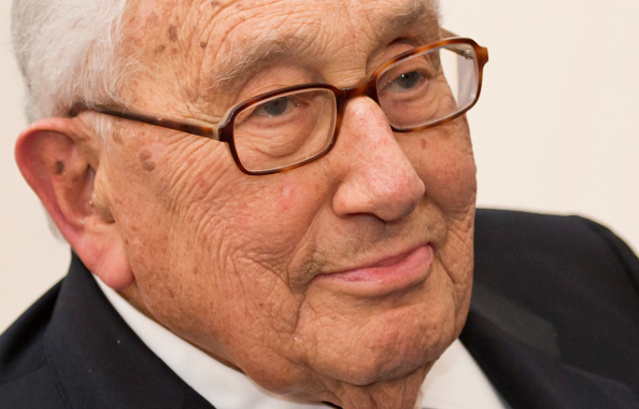
It’s unusual to see a longtime Republican agree with a near-Communist about any issue. Yet Henry Kissinger and Jeremy Corbyn, the leading candidate to lead the U.K. Labour Party, see eye to eye on one thing: the Ukraine crisis.
Corbyn is pro-Russian, and it’s no surprise; European radicals on both the left and on the right tend to back President Vladimir Putin if only because the establishment hates him. Corbyn has recently received so much airtime on RT, Russia’s English-language propaganda channel, you might think he was running for the leadership of Putin’s party, United Russia.
Kissinger is another matter. The architect of detente between the U.S. and the Soviet Union in the 1970s is a proponent of realpolitik rather than value-based policies, but he is no fan of Putin’s. Yet he and Corbyn use similar language when talking about the conflict between Russia and the West over Ukraine.
Here’s Corbyn:
The hypocrisy of the West remains unbelievable. NATO has sought to expand since the end of the cold war. It has increased its military capability and expenditure. It operates way beyond its original 1948 area and its attempt to encircle Russia is one of the big threats of our time.
Here’s Kissinger:
Breaking Russia has become an objective; the long-range purpose should be to integrate it.
Corbyn:
We should oppose any foreign military intervention in Ukraine, as that would only succeed in that country reliving its traumatic past as a battleground where Russia and Western Europe vie for supremacy.
Kissinger:
One should at least examine the possibility of some cooperation between the West and Russia in a militarily nonaligned Ukraine.
The retired conservative and the suddenly resurgent socialist both speak of the need to take into account Ukraine’s history with Russia. Kissinger says the two countries’ relationship can never be limited to one of two traditional sovereign states, “not from the Russian point of view, maybe not even from Ukraine’s.” Corbyn reminds his audience that “Ukraine’s national borders have ebbed and flowed with the tides of history, from being the original heartland of Russian civilization, expanding under Moscow’s rule during the tsarist era and becoming part of the Soviet Union after 1917.”
Both Corbyn and Kissinger have problems with people who are fighting on the Ukrainian side. The British leftist talks about “far-right and racist involvement” in the uprising that toppled former President Viktor Yanukovych. Kissinger bemoans the support Ukraine has received from anti-Russian groups from the Caucasus: “When you read now that Muslim units are fighting on behalf of Ukraine, then the sense of proportion has been lost.”
In other words, both agree that the Western approach to the crisis must take into account the stormy relationship Ukraine has had with Russia through the ages; that the West would be better off finding a way to cooperate with Russia rather than trying to break it; and that the Ukrainian government has found some strange bedfellows in its fight to dissociate itself from Moscow — forces with which the West shouldn’t ally. And even though both Corbyn and Kissinger believe Putin overstepped the mark in Ukraine, punishment is not a strategy either of them favors.
This dovish view is decidedly on the fringe. The current Western mainstream — and the leaders in charge of handling the Ukraine crisis — reject it with stock arguments that aren’t easy to counter: Most Ukrainians want to leave their country’s common history with Russia behind. There’s no way to cooperate with Putin because he isn’t bound by his word. The West has done its best to keep out of the military confrontation, refusing even to supply lethal weapons to Ukraine. Finally, no one can prevent those who support Ukrainian independence from fighting for it.
Perhaps Corbyn and Kissinger are doves because, as outsiders, they can afford that luxury. It’s easy to sit back and imagine how they might have handled the situation at an earlier stage. They might, for example, have included Russia in trade talks between Ukraine and the European Union, working out a deal that could have suited all sides and prevented the Ukrainian “Revolution of Dignity.” And if that uprising happened anyway, they might have cooperated with Russia in negotiating with its leaders rather than fostering a conflict between Kiev and Moscow.
Such scenarios are purely hypothetical, though. Yes, the EU, NATO, Washington, Moscow or Kiev might have saved thousands of lives by handling things differently. The problem with the doves is that they don’t offer a credible alternative to the rather clear, moderately hawkish policy that Western leaders are pursuing now: maximum nonlethal aid and political support for Ukraine, and for Russia, containment in the hope that its corrupt political system and oil-dependent economy can’t bear the weight of Putin’s imperial ideology.
It’s only sane to want to shun confrontation and seek an end to conflict. However, the doves would be much more convincing — and more numerous — if they could suggest something new and useful to be done today. As it is, they sound as if they think it best to just leave Ukraine to Putin.
By Leonid Bershidsky, Bloomberg





